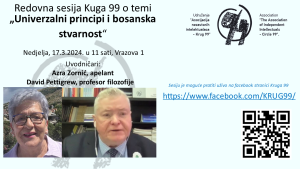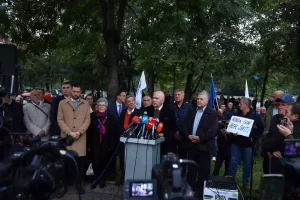THE CURRENT POLITICAL SITUATION IN AND AROUND BOSNIA AND HERZEGOVINA – BOSNIA’S PATH TO THE EU AND NATO

| Krug 99 – Circle 99 Sarajevo, Bosnia and Herzegovina Summary of Session of 19 November 2023 – 47 THE CURRENT POLITICAL SITUATION IN AND AROUND BOSNIA AND HERZEGOVINA – BOSNIA’S PATH TO THE EU AND NATO At this time two conflicts are raging that will to a great extent determine the future of the international order as we have known it. There is the war in Ukraine, or, In other words, the Russian Federation’s aggression against Ukraine. This war is exerting an exceptionally destructive impact on the European and international security architecture. It represents a crisis in terms of the security of energy and food supplies, the mobility of goods and people, new waves of migration, etc. The aggression against Ukraine is an assault on the international order as posited by the U.N. Charter, which guarantees the principles of inviolability of borders, the right to territorial integrity and the sovereignty of internationally recognized states. In providing aid to Ukraine, we are not only helping to defend Ukraine; we are also defending ourselves, our own freedoms and our own values. The other conflict is the ongoing occupation of the Gaza Strip. The best assessment of the situation in Gaza came from U.N. Secretary General Antonio Guterres. In his 24 October address to the U.N. Security Council, he condemned the attack by Hamas on 7 October, when more than 1400 civilians were killed without justification. But he added that “Hamas’s attacks did not occur in a vacuum, because the Palestinian people have for 56 years suffered under repressive occupation, constant seizure of lands, a stifled economy, a population displaced and Palestinian homes destroyed.” Time will tell what will happen in this rapidly changing world. Suffice to say, given its geopolitical situation and multiethnic structure of its population, Bosnia and Herzegovina has never been spared when it comes to big power maneuverings and has never found itself outside the orbit of regional aspirations. That’s the way it was in the 1990s after the fall of the Berlin Wall, and that’s the way it is today. Neighboring states must by actions not just words accept the territorial integrity, sovereignty, political independence and internationally recognized legal identity of Bosnia and Herzegovina. Sovereignty is a concept that is frequently omitted when the leaders of neighboring countries speak about Bosnia. But they should by their actions respect the territorial integrity, the internal and external sovereignty and the political independence of Bosnia. They have no right to interfere in the internal affairs of Bosnia and Herzegovina. Our relations should be based on mutual respect and reciprocity. One particular step that could be taken in the direction of building good neighborly relations would be ratification of a border agreement by Croatian Parliament and the signing of a border agreement with Serbia. There can be no compromise here. Without this, doubts would remain about territorial ambitions, packaged into various forms of the “Serbian world,” or territorial exchanges or the creation of ethnically pure areas or “great states.” The current political situation in Bosnia is developing in two different directions. One is optimistic, pro-European and democratic, and it evinces strong intentions to accelerate EU and NATO integration, strengthen economic development, establish the rule of law and in general advance the status of Bosnia both regionally and internationally. The other direction is imbued with quasi-democracy, anti-Bosnianism and false Europeanism, along with opposition to NATO integration, as advocated by Milorad Dodik and seconded by his political party, thus turning themselves into proxies for Russian interests in Bosnia and in the region beyond. The recent European Commission decision about a possible conditional beginning of talks with Bosnia and Herzegovina is a positive and optimistic step. Granting a conditional green light means that by March of 2024 a certain amount of progress should be made and registered in the Commission’s progress reports. Bosnia’s path into NATO has already been enshrined in the most important documents of the state. These are the Bosnian Constitution, the Bosnian Defense Law and the Bosnian Foreign Policy Strategy. But at this time there is no consensus within Bosnia about NATO membership. We should be a state where there is rule of law and where constitutional and legal obligations are respected. This is not optional but rather mandatory. For this reason, NATO integration will continue to be one of the most significant domestic and foreign policy priorities of Bosnia, along with EU integration. There is no alternative. A summary of this Session reached the following conclusions: First, we live in challenging times when the geopolitical order is changing, and those changes are happening quickly and inexorably. Bosnia needs to take appropriate measures. This means that we should not step away from our most important foreign policy priorities, which are EU and NATO integration. There will be attempts from the outside, both direct and indirect (hybrid), to draw Bosnia into some other alliances, such as the Open Balkans, BRICS, or something similar. But there is no alternative to the Euro-Atlantic option. This is the world to which we belong, geographically and culturally. The peoples living in Bosnia are original native European peoples. We did not immigrate into Europe, but rather we have lived in Europe for more than one thousand years, and we will remain here. So, the only natural path for us is the path to Europe. Second, we need to have good economic relations with everyone, with allies both in the East and in the West. Capital does not recognize borders, religions or nations. Investors need to enjoy stability and security as fundamental preconditions for investing. In this way, young people will tend to remain here. In the ideological sense, the Western principles of democracy, freedom and human rights are inalienable. There is no place for an anti-Western narrative. Because, no other narrative could possible guarantee what the citizens of Bosnia need, and that is peace, prosperity and security. We need to hold our allies close, both in the East and in the West, and to adhere to partnerships and alliances embodied in EU and NATO integration. Third, we also live in a time of growing radical right-wing populism, in a time of xenophobia, anti-Semitism and Islamophobia. Within this context, we need to preserve that which has characterized us for more than 500 years, and that is peace, tolerance and coexistence. Radicalism and extremism of any kind has never served anyone in Bosnia well, while conflicts have always been kindled from outside. There was never a civil war in Bosnia, because the various religions and peoples here have always coexisted in harmony and tolerance. But we have suffered from time to time occupation, aggression and attacks against Bosnia, primarily by large imperialist powers and neighboring states. So, we appeal to all the citizens of Bosnia and Herzegovina to shun the path of hate towards one another, but rather to preserve the traditional values of our world and our civilization and to be European, to be cosmopolitan and tolerant citizens of Europe and of the world. ** The presenter was: Dr. Denis Zvizdic, Chairman of the House of Representatives of the Parliament of Bosnia and Herzegovina *** Adil Kulenović, predsjednik |
| Association of Independent Intellectuals – Circle 99 (Bosnian: Krug 99), a leading Bosnian think-tank, was established in Sarajevo in 1993, in the midst of the Bosnian war (1992-1995), while the capital was under siege. Circle 99 provides a platform to bring together intellectuals of various professional and ethnic identities; university professors, members of the Academy of Sciences and Arts of Bosnia and Herzegovina, artists, journalists, entrepreneurs, diplomats, and other prominent figures from Bosnia and from abroad. Multidisciplinary discussions and initiatives are held each Sunday throughout the academic year, in the form of regular sessions about politics, science, education, culture, economy, and other societal issues. The overall goal is to sensitize the public towards a democratic transformation, achieving and maintaining peace, and integration of modern Bosnia into the community of countries fostering liberal democracy. Circle 99 has been declared an organization of special significance for the city of Sarajevo. |







